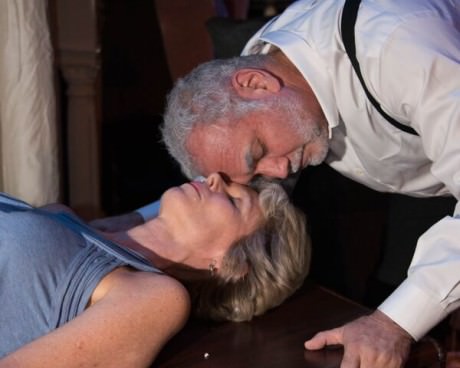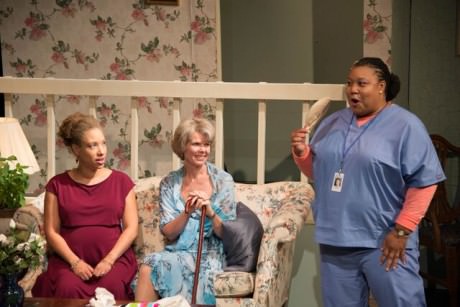Romeo and Juliet has a special place in our popular culture. BBC’s 60 second Shakespeare has a hilarious front page, “Double Teen Death Horror”; “City’s Top Clans Devastated after Botched Love Pact.” Juliet is described as a “junior beauty” who at this point had “never been in any trouble.” Romeo is a “well-liked lad around town” and Tybalt “[a] troublemaker…Friends described him as ‘bitter’.”

Facebook features the following, by Sound Remedy:
Romeo & Juliet (2013)
J: lol where r u romeo
R: wanna come over?
J: can’t
R: y?
J: idk parents
R: let’s kill ourself
J: lol k
R: swag
J: swag
The story is so well known it can often be compelling, even without, as in Shakespeare’s version, some of the greatest poetry of all time. Unexpected Stage Company and Director Christopher Goodrich are to be applauded for their effort to interpret the play in an unorthodox way; in this case, setting the play in “Verona Village” a Senior Living Community. Juliet, instead of being 13, is about to have her 70th birthday. Romeo also a resident of the community, and the Capulets and Montagues are their adult children.
There is a proud tradition of unusual productions of this iconic play. In a French version in the 18th century, Playwright Jean-Francois Ducis turned Montague into a leading role, cut the balcony scene, and gave the play a happy ending. When he was head of the Court Theatre at Weimer, Goethe produced a version in which there were no brawls between the Montagues and Capulets and therefore no reconciliations. He was reportedly afraid to publish the text.
There are many traps for the unwary in a play which can seem effortlessly beautiful. Romeo can be a difficult role, even for the greatest actors. John Gielgud was told by 1924 by Ivor Brown: “Mr Gielgud’s body from his hips down never meant anything throughout the evening. He has the most meaningless legs imaginable.” In 1935, Gielgud produced a Romeo and Juliet in which Gielgud played Mercutio and Olivier Romeo, and both switched parts after six weeks. Olivier received less than glowing reviews for his handling of the verse, although according to Gielgud he was too proud to mention it. In a review entitled Two Gentlemen in Verona James Agate stated that he wanted to halt the performance to tell Olivier to stop rushing.
In Unexpected Stages’ Romeo and Juliet, Elliott Bales as Romeo excels in the later scenes, as he admonishes Friar Laurence, “Thou canst not speak of what thou dost not feel!” His Romeo is choleric in the early scenes, rather than the Petrarchan romantic. He is more the soldier or businessman than the lover, although his love for Juliet comes through as deep and true.
A 70-year-old Juliet is a challenge indeed, and Claire Schoonover rises to the occasion. She is a lovely Juliet, sensitive and deeply in love with her Romeo. She has a beautiful command of the language, and is a skilled enough actress that when she is treated like a child it comes across as the indignity it truly is.
Kecia A. Campbell has a real triumph as the Nurse, deliciously comic in her early scenes, and showing us a woman who loves Juliet, but sincerely believes that once Romeo is banished, perhaps Paris is the more practical choice. It is easy, too, to see why Juliet would view this as a betrayal.
Justus Hammond’s Mercutio appears to be on the staff of the retirement home, from the way he is dressed. He handles the language well, and turns in an unusually affable Mercutio.
Karen Fleming as Benvolio fulfills her role as peacemaker capably and with grace.
But from the beginning, there are some conceptual oddities which become somewhat distracting. For some reason the adult children of the Montagues and Capulets hate each other. Still, very few adult children are desperate to marry off their parents who are in nursing homes. Nor do residents, as here, carry knives and kill one another. It is also difficult to believe that Romeo and Juliet meet in secret, when they likely live a few rooms away from each other.
This is not to say there are not pleasures in this production. One benefit of the old-age setting is to accentuate the comedy. Romeo, after his first night with Juliet, does a geriatric “walk of shame” which is entertaining. The Nurse is a standout in this regard. In the first scene, the Montagues and Capulets are ingenious in their use of weapons; fire-irons; staplers; scissors, etc. And the work is always thought-provoking, because the ramifications of the novel time and location are so great. In modern-day reality a Romeo who killed would be in jail and thus unavailable for the rest of the play. Cell phones would remove the necessity of letters. And doctors would surely be able to tell that Juliet is not really dead.
Such distractions make it more difficult to appreciate the many fine qualities on display. Kim Curtis’ Tybalt is suitably pugnacious, as the Capulet’s “King of Cats.” His Apothecary, in contrast, looks like a seedy drug dealer from the LA streets, which works well.

Dawn Thomas Reidy and Josh Adams as the Capulets make in intriguing couple; because he is so young, Adams seems more sulking than enraged when he chastises Juliet.
Reidy, heavily pregnant, succeeds in walking a fine line; she is believably upset at various turns of events, but she avoids the cold nastiness that one so often sees in the role.
Rachel Stroud-Goodrich as Lady Montague and Tiffany Garfinkle as Montague are portrayed sympathetically and well.
Ken Lechter’s Paris is convincing as a well-dressed and amiable Paris.
Ted Schneider’s Friar Lawrence wears a cross, and is refreshingly robust and outspoken. But again, questions come to mind. How could they get married, without licenses, in a modern senior community? Would Romeo and Juliet, healthy and aware in their 70’s, really rely so heavily on Friar Lawrence and the Nurse for advice?
The set design can be especially demanding. The play encompasses a market place, a ballroom, a garden beneath a balcony, a friar’s cell, and a funeral vault. The set design by Kristen Jepperson is admirably detailed; there are board games under the coffee table and a sign on the reception desk. The flowery patterns on the furniture and walls; the generic pictures; all fit in perfectly with the concept of the modern nursing home. Instead of Juliet standing at a balcony, Romeo stands on the upper landing, while Juliet is downstairs. Still, the set design, in this case, is probably too limited to accommodate the variety of locations.
Lighting Design by Peter Dowty is inobtrusive and very appropriate. Sound Designer Sean Doyle has selected what sound like “Big Band” themes for the music, again, a perfect choice for the venue.
And Costume Designer Briana Manente and Props Master John Barbee do fine work. Juliet’s clothes are particularly striking. Fight Choreographer Casey Kaleba has an unusual challenge here; his combat is as always, fluid and well-staged.

With the aging of the Baby Boom generation, it is no surprise that falling in love when one is older has become a topic of interest. This is all to the good. But Shakespeare actually lowered Juliet’s age from his original source, to emphasize the immaturity of the lovers. No one will deny that older people fall in love, possibly now more than ever. But it is hard to believe they fall in love like Romeo and Juliet did.
The risks taken in Romeo and Juliet: Love Knows No Age are admirable, but perhaps further adaptations of the play would be helpful in getting across the message that love knows no age. There is certainly much to enjoy in Romeo and Juliet: Love Knows No Age, and it is a fine production. I look forward to more productions by this talented company.
Running Time: 2 hours and 30 minutes, with one 15-minute intermission.
Romeo and Juliet: Love Knows No Age plays through August 9, 2015 at Unexpected Stage Company performing at Randolph Road Theatre – 4010 Randolph Road, in Silver Spring, MD. For tickets, call (800) 838-3006, or purchase them online.





